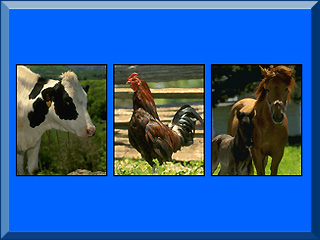
This CD was designed to treat attention and memory deficits from a variety of causes. All of the activities are appropriate for children (as young as pre-K) and adults, depending on the starting point and treatment goals.
Target Audience: Appropriate for ages three through adult with diagnoses of: Aphasia, TBI, Apraxia, Dysarthria, Orientation Disorders, Attention Disorders, Auditory Memory Disorder, Visual Memory Disorder, Phonemic Awareness Difficulties, Naming Disorders, Language Comprehension Weakness, Verbal Expression Disorders, Autism, and Hard Of Hearing.
WN13-2
$5.00
Attention and Memory: Volume I
by LocuTour Multimedia
Attention and Memory: Volume I (Windows)
Information for Professionals:
Activities for orientation, arousal, and discrimination. The activities provide auditory discrimination training in five areas:
Activities for sound discrimination, accessing remote memory, cross modal matching, and sustained attention. Activities include recognition of animal, city, house, and other environmental sounds.
The Language Attention Module includes activities for phonological processing; auditory and visual segmentation of real words; multi-syllable segmentation of words/phrases. A vocabulary section contains hundreds of full color photographs and drawings.
This module requires visual perceptual matching for size, color, shape, letters, simple and complex words, patterns, and number/symbol decoding. Each category provides activities from a fundamental skill training level to a complex processing level.
The High Level Attention Module provides cognitive rehabilitation for sustained, alternating, divided, and focused attention deficits. The activities include:
This module was designed to treat clients with TBI, Mild Post Concussion Syndrome, and Attention Deficit Disorder.
These are activities selected from the Auditory and Visual Perceptual Modules with the added memory component of stimulus fade time.
This CD is appropriate for ages three through adult with diagnoses of: Aphasia, TBI, Apraxia, Dysarthria, Orientation Disorders, Attention Disorders, Auditory Memory Disorder, Visual Memory Disorder, Phonemic Awareness Difficulties, Naming Disorders, Language Comprehension Weakness, Verbal Expression Disorders, Autism, and Hard Of Hearing.
Download Progress Charts in Adobe Acrobat format:
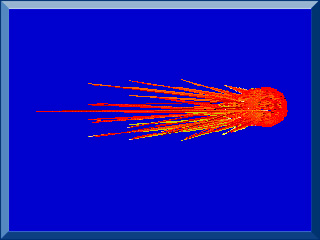
The Orientation Module has six activities for orientation, arousal, and discrimination. The activities provide auditory discrimination training in five areas: left/right ear, tempo, loudness, pitch, and speaker (voice) discrimination.
Sights and Sounds Around Me has 200 pictures. View pictures of people, animals, clothing, food, household/kitchen objects, outside scenes, patterns, plants, and toys.
Meteor is a game that encourages clients to attend to and scan the computer screen.
Hello is a good game for the client who needs to practice responding to a specific stimulus. The phone rings and the client clicks on the phone or presses the space bar to “answer” it. Male/female, child/adult voices are contrasted and the client makes a decision about which speaker made the statement.
Left Ear? Right Ear?; Loud or Quiet?; and Tempo Please teach sound discrimination.
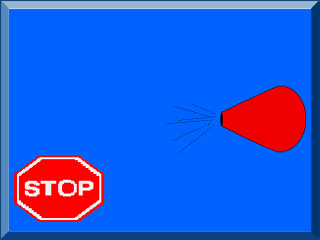
The Auditory Attention Module presents activities for sound discrimination, accessing remote memory, cross modal matching, and sustained attention. Activities include recognition of animal, city, house, and other environmental sounds.
The Little Duck Says Quack, Quack, Quack; In the City; and Around the House are three sound identification games that help the client associate the environmental sound to the picture.
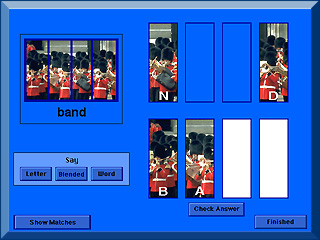
The Language Attention Module includes activities for phonological processing; auditory and visual segmentation of real words; multi-syllable segmentation of words/phrases. A vocabulary section contains hundreds of full color photographs and drawings.
Photo Detail has three games for receptive and expressive language practice. Start with a simple forced choice format. In the hardest game, clients are asked to find visual absurdities in the picture. The auditory requests increase in length and difficulty from single words to sentence level commands.
Cut Ups! is a sound segmentation game. The client listens as the word is spoken, determines which sounds are made by each letter, and puts the jumbled letters into the correct order. 156 pictures with four levels.
And a One, Two, Three is a syllable segmentation game. The client listens for the number of syllables (1-6) as the word is spoken, and moves the correct number of colored squares to the line below. There are 316 pictures.
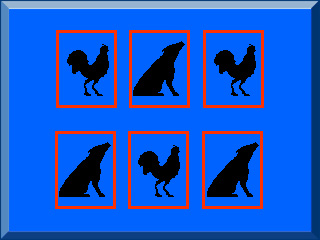
This module requires visual perceptual matching for size, color, shape, letters, simple and complex words, patterns, and number/symbol decoding. Each category provides activities from a fundamental skill training level to a complex processing level.
Match Up Games require the client to choose the form at the bottom of the screen that matches the form at the top. Clients match color, size, shape, and letter in several levels of difficulty.
Match Up Words requires the client to choose the word at the bottom of the screen that matches the word at the top. Eight levels progress from V/CV/VC to CCCVC. There are thousands of real words for reading practice.
Patterns is a pattern completion game for auditory and visual sequencing practice. The client completes the pattern by dragging the appropriate pictures to the empty boxes. There are three levels of difficulty.
Secret Decoder is a shifting attention exercise. Find the picture at the top of the screen that matches each of the pictures below and type its number. Corresponds to the classroom skill of copying information from the blackboard.
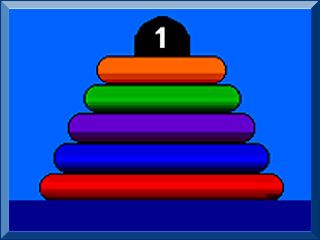
The High Level Attention Module provides cognitive rehabilitation for sustained, alternating, divided, and focused attention deficits. The activities include: continuous performance; visual scanning with 10 levels of difficulty; go/no-go; and several mental reasoning; flexibility and problem solving tasks.
This module was designed to treat clients with TBI, Mild Post Concussion Syndrome, and Attention Deficit Disorder. This Module is available separately.
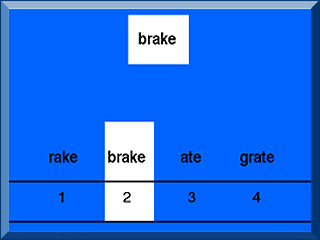
This module presents activities selected from the Auditory and Visual Perceptual Modules with the added memory component of stimulus fade time.
In the Auditory Memory and Attention Games the length of time that the sound plays can be controlled from the tempo menu option. Tempo times are Fade Very Fast, (about .5 seconds), Fade Fast, Fade Regular, Fade Slow, and Fade Very Slow (about 8 seconds).
In the Visual Memory and Attention Games the stimulus appears for a pre-determined amount of time then disappears. The clinician chooses a tempo appropriate for each client.
This CD is appropriate for ages three through adult with diagnoses of: Aphasia, TBI, Apraxia, Dysarthria, Orientation Disorder, Attention Disorder, Auditory Memory Disorder, Visual Memory Disorder, Phonemic Awareness Difficulty, Naming Disorder, Language Comprehension Weakness, Verbal Expression Disorder, Autism, and Hard Of Hearing.